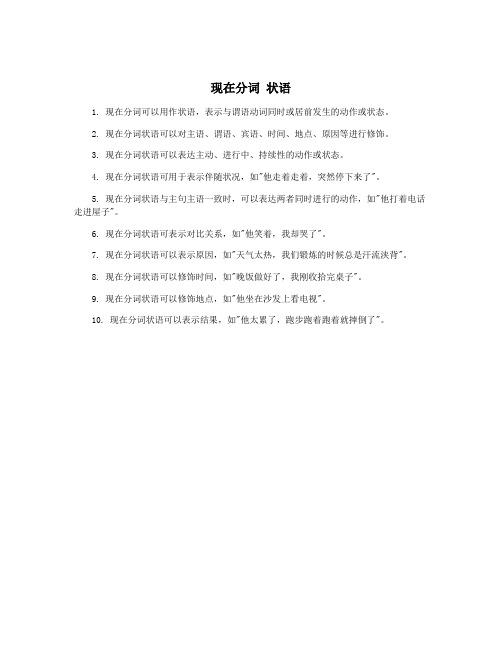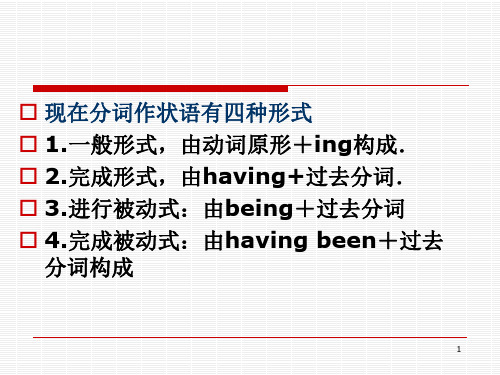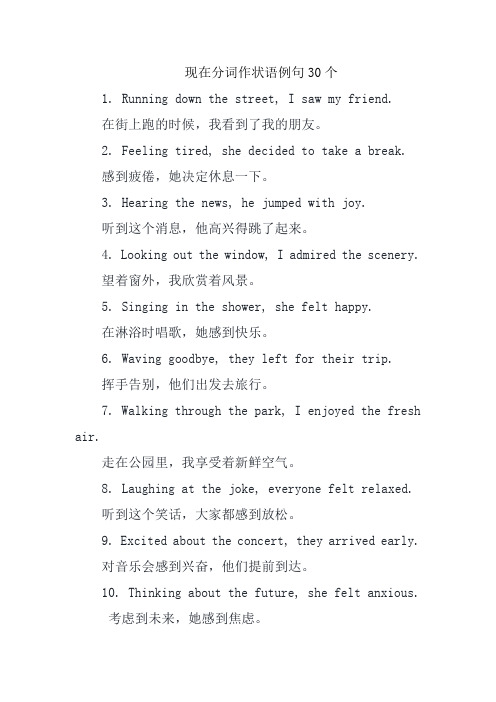现在分词做状语
现在分词作状语

5) Four people entered the room looking
around in a curious way. 伴随状语 = Four people entered the room and looked around in a curious way. 6) He came running back to tell me the news. 方式
13. Generally speaking, ______ according to the directions, the drug has no side effect. A. when taking
B. when taken
C. when to take
D. when to be taken
Choose the best answer.
1. The stranger said something in a
_______ voice and the little girl was very much _______. A. frightening, frightened B. frightened, frightening C. frightening, frightening D. frightened, frightened
5. “Can’t you read?” the man said, angrily pointed to the notice on the wall. pointing
6. Knocking at the door before entering, please. Knock 7. European football is played in 80 countries, made it the most popular sport in the world. making
现在分词 状语

现在分词状语
1. 现在分词可以用作状语,表示与谓语动词同时或居前发生的动作或状态。
2. 现在分词状语可以对主语、谓语、宾语、时间、地点、原因等进行修饰。
3. 现在分词状语可以表达主动、进行中、持续性的动作或状态。
4. 现在分词状语可用于表示伴随状况,如"他走着走着,突然停下来了"。
5. 现在分词状语与主句主语一致时,可以表达两者同时进行的动作,如"他打着电话走进屋子"。
6. 现在分词状语可表示对比关系,如"他笑着,我却哭了"。
7. 现在分词状语可以表示原因,如"天气太热,我们锻炼的时候总是汗流浃背"。
8. 现在分词状语可以修饰时间,如"晚饭做好了,我刚收拾完桌子"。
9. 现在分词状语可以修饰地点,如"他坐在沙发上看电视"。
10. 现在分词状语可以表示结果,如"他太累了,跑步跑着跑着就摔倒了"。
现在分词做状语

现在分词做状语现在分词被用作状语。
其实大多数情况下,现在分词和它的关联成分一起作状语,也就是现在分词短语作状语,相当于它对应的状语从句。
大多数情况下,可以放在句首,也可以放在句尾。
例:1.作时间状语Entering the classroom, the students began to read English.一进教室,学生们就开始读英语。
(相当于As soon as/After they entered the classroom)2.作原因状语The girl doesn't feel like eating any food, being ill for a few days.这个女孩不想吃任何食物。
她已经病了几天了。
(相当于Because she has been ill for a few days或Because of her being ill for a few days)3.作条件状语Working hard, he will succeed in passing the English examination.如果他努力学习,他能通过英语考试。
(相当于从句If he works hard)4.作让步状语Being tired after work, he still insists on studying French.下班后很累,他仍然坚持学习法语。
(相当于Though he is tired after work或Though tired after work)5.作结果状语People all over the world sing the song, making it popular.全世界的人都唱这首歌,这使它流行起来。
(相当于so that they make it popular)6.作方式状语Travelling by car , we enjoyed many beautifull places.开车旅行时,我们欣赏了许多美丽的地方。
现在分词作状语有几种形式-有用

(4)表示结果
a. The old man died, leaving nothing but debts.
b. we hurried to school ,finding there were no students in the school.
c. They opened fire, killing one of our patrolmen.
2
Relying on our own efforts, we overcame all the difficulties.
They stood there for an hour ,watching the game.
Don’t just stand there doing nothing.
Judging from his accent, he seemed to be from Hunan province.
=If we judge…
29
Generally speaking, every spy has a contact.
Considering his age, he was helped by the young fellow.
23
注意2:分词作状语时,分词和 句子的主语一定要有逻辑上的主 谓关系
逻辑上的主谓关系即分词的动作 由句子的主语发出或承受.
24
We are sitting here, making notes. make的动作由主语我们 发出
Being scolded by his mother, the boy hung his head. Scold 的动作由the boy承受
27
He entering the office, a letter was found on the ground.
现在分词作状语例句30个

现在分词作状语例句30个1. Running down the street, I saw my friend.在街上跑的时候,我看到了我的朋友。
2. Feeling tired, she decided to take a break.感到疲倦,她决定休息一下。
3. Hearing the news, he jumped with joy.听到这个消息,他高兴得跳了起来。
4. Looking out the window, I admired the scenery.望着窗外,我欣赏着风景。
5. Singing in the shower, she felt happy.在淋浴时唱歌,她感到快乐。
6. Waving goodbye, they left for their trip.挥手告别,他们出发去旅行。
7. Walking through the park, I enjoyed the fresh air.走在公园里,我享受着新鲜空气。
8. Laughing at the joke, everyone felt relaxed.听到这个笑话,大家都感到放松。
9. Excited about the concert, they arrived early.对音乐会感到兴奋,他们提前到达。
10. Thinking about the future, she felt anxious.考虑到未来,她感到焦虑。
11. Studying hard, he passed the exam with flying colors.努力学习,他顺利通过了考试。
12. Cooking dinner, she listened to music.做晚餐时,她听着音乐。
13. Running late, he hurried to catch the bus.赶时间,他急忙去赶公交车。
14. Smiling at the compliment, she thanked him.对赞美微笑,她对他说了谢谢。
现在分词作状语

现在分词作状语如果现在分词表示的是主句动作的方式或手段,可以用作方式状语。
这时分词通常放在主句谓语动词之后。
例如:①He drove to the airport,listening to the。
all the way.他一路听着收音机,开车去了机场。
②She sat at the table,XXX.她坐在桌前写信。
③He solved the problem,using a new method.他用一种新方法解决了这个问题。
④The children ran out of the classroom,XXX.孩子们边跑边笑着喊着走出教室。
三、作原因状语现在分词有时可表示主句动作的原因,这时分词放在主句谓语动词之前,其前常加上连词because或owing to。
例如:①Being tired,he went to bed early.由于累了,他早早上床睡觉了。
②Owing to the heavy rain,the game was put off.由于下大雨,比赛被推迟了。
③Because of having missed the train,he was XXX.因为误了火车,他开会迟到了。
四、作让步状语现在分词有时可表示主句动作的让步,这时分词放在主句谓语动词之前,其前常加上连词though或although。
例如:①Though tired,he went on working.虽然累了,他还是继续工作。
②Although having failed many times,he didn't give up.虽然失败了很多次,他没有放弃。
③Though XXX,he still made the mistake.虽然老师警告过他,他还是犯了错误。
五、作条件状语现在分词有时可表示主句动作的条件,这时分词放在主句谓语动词之前,其前常加上连词if或unless。
例如:①If left alone,the baby will cry.如果不理睬它,婴儿会哭的。
现在分词作状语

现在分词作状语现在分词短语可以用作状语,修饰句子中由谓语表示的主要动作。
这个状语可以表示动作发生的时间、原因、结果、条件、或表示主要动作发生的伴随情况,通常相当于一个状语从句或并列分句。
一般说来,这种结构的逻辑主语就是句子的主语。
一、作时间状语 如果现在分词的动作和主谓语的动作同时发生,分词用一般式,有时其前可以加上连词while或when。
例如:①Hearing the news,they all jumped with joy.② Walking slowly across the grass,he pointed the gun at the lion and fired. ③One day,while walking along the sands towards his boat,Crusoe saw in the sand the mark of a man's foot. 如果现在分词的动作结束之后,谓语动词的动作才发生,现在分词应用完成式。
这时分词所表示的动作有一定的持续性。
例如: ① Having watered the flowers,he began to cut the grass. ② Having eaten his dinner,the boy rushed out. ③Hearing the footstep below(=When he heard the footstep below),he rose and went to the top of the stairs.④ Seeing a large cake flying through the air,the driver pulled up quickly.注:①分词动作一发生,谓语动作紧跟着发生,这时用现在分词的一般式作时间状语,其逻辑主语为句中的主语。
常用的动词,如:hear, see, arrive, return, get to, look, open, close, leave, turn around, walk等,表示一个极短暂动作。
现在分词作状语

4. Lots of rescue workers were working around the clock, _____ supplies to Yushu, Qinghai Province after the earthquake. (福建2010) A. sending B. to send C. having sent D. to have sent
Having been translated ______________________into many languages, the book was widely read all over the world. ( translate ) Having finished _____________his homework , he went to bed. ( finish )
T
Practice
单句改错
1. Having not seen the film, I can’t tell you what I think of it. Not having 2. The men worked for extra hours got an extra pay. working 3. Seen from the top of the hill, we find the city more beautiful. Seeing 4. Generally speak, facial expressions are helpful communications, too. speaking
5. “Can’t you read?” the man said, angrily pointed to the notice on the wall. pointing 6. Knocking at the door before entering, please. Knock 7. European football is played in 80 countries, made it the most popular sport in the world. making
- 1、下载文档前请自行甄别文档内容的完整性,平台不提供额外的编辑、内容补充、找答案等附加服务。
- 2、"仅部分预览"的文档,不可在线预览部分如存在完整性等问题,可反馈申请退款(可完整预览的文档不适用该条件!)。
- 3、如文档侵犯您的权益,请联系客服反馈,我们会尽快为您处理(人工客服工作时间:9:00-18:30)。
语法一:现在分词做状语现在分词(动词的ing 形式)做状语时,通常都表示主语正在进行的另一动作,其逻辑主语必须与句子的主语保持一致,且必须与句子的主语是逻辑上的主谓关系;动词的ing形式表示的动作是次要动作。
现在分词可以做时间,条件,结果,让步,方式等状语。
相当于相应的状语从句。
作时间,原因或条件时,通常位于主句前面,作方式,伴随或结果状语时,通常位于主句后面。
如果分词所表示的动作和谓语的动作同时发生或几乎同时发生,用现在分词的一般式。
如果分词动作明显在谓语动词之前发生,用现在分词的完成式。
(having done),在作时间状语的分词前,可加连词while, when,介词after, before, on等。
一. 做伴随状语:分词等于and连接两个动词或分句。
1:The dog came in. It followed its master. =The dog came in, following its master.2:The children ran out of the room, laughing and talking merrily.3:They stood there for an hour, watching the game.二.原因状语相当于as, since, because等引起的原因状语从句,常位于句首,句中或句末。
1. He was a brave man. He decided to return to France. = Being a brave man, he decided to return to France.2:Seeing nobody at home, she decided to leave them a note.3:No t knowing her address, we couldn‟t get in touch with her.4:Being so poor in those days, we couldn‟t afford to send the boy to hospital.5.Having worked among the peasants for many years, he knew them very well.6. Not having received an answer, he decided to write another letter.三.时间状语,相当于when, while ,as 等引导的时间状语从句,常位于句首或句末。
1:First he returned to France. Then he was put into prison. =After he returned to France, he was put into prison. =Having returned to France, he was put into prison.2:Having arrived at the factory, they immediately set to work. Be careful when crossing the street.3:Don‟t mention this while talking to him.4:On arriving in London, he managed to get in touch with her.=As soon as he arrived in London. 5: Having read the letter, she got very excited.四.条件状语,相当于一个if 等引导的条件状语从句,常位于句首。
1:Working hard, you will succeed.2. If I know anything about it, I will tell you all. =Knowing anything about it, I will tell you all.3.-I could go and get someone to bring the car.-No, thanks. I‟ll be better if walking五:结果状语现在分词表示必然结果,前可加thus,不定式表意外的结果,前可加only。
1:Her husband died in 1942, leaving her with five children.2:The bus was held up by snowstorm, thus causing the delay.3:He was caught in the rain, thus making himself catch cold.六:让步状语:相当于although, though, even if, even though引起的让步状语从句,常位于句首。
1. Although he had bought a lot of books for the exam, he failed in it because of the learning method.=Buying a lot of books for the exam, he failed in it because of the learning method.2. Though they knew all this, they made me pay for the damage.=knowing all this, they made me pay for the damage.七.方式状语分词等于介词with引起的方式状语或and并列的两个谓语动词.1.Walking slowly,I approached (靠近)the little = By walking slowly, I approached the little window.window.2.He stood leaning against(靠在..上)the wall.=He stood and leaned against the wall.八:现在分词的完成式指分词所表示的动作发生在主句中谓语动词之前,若分词所表示的动作与主语之间是主谓关系,则用having done, 若是动宾(被动)关系,则用having been done. 1;Having worked in the country for three years, he knew how to grow vegetables.2: Having been translated into several languages, the book became famous all over the world.3:Having finished his homework, he went to bed.4: Having lived in New York for years, I know each part of it very well.九:现在分词独立成分的特殊使用:generally speaking:一般来讲,frankly speaking : 坦白地说。
exactly speaking,严密地讲,正确地说。
judging from / by…,从….可以判断出来。
considering ….考虑到…1: Generally speaking, girls are more interested in literature than boys.2: Judging from her accent, she must come from Arabian countries.十:现在分词与过去分词作状语的区别。
现在分词与过去分词做状语的最主要区别在于两者与所修饰的主语的主动与被动关系的区别。
(1)现在分词作状语时,现在分词的动作就是句子主语的动作,它们之间的关系是主动关系。
1. He went out shutting the door behind him. 他出去后将门随手关上。
2. Not knowing what to do, he went to his parents for help. 由于不知如何办是好,他去找父母帮忙。
(2)过去分词作状语时,过去分词表示的动作是句子主语承受的动作,它们之间的关系是被动关系.1. Faced with difficulties, we must try to overcome them. 在遇到困难的时候,我们必须设法克服。
2. Given more attention, the trees could have grown better.语法二:动词不定式和动名词做宾语的区别。
一:.通常只能接不定式作宾语的动词:agree (同意);offer (提出);intend,plan (打算,计划);demand,ask (要求);promise (答应);help (帮忙);prepare (准备);decide (决定);refuse (拒绝);choose (选择,决定);wish,hope,want,expect (希望,想要);fail (不能;忘记);pretend (假装);manage (设法);determine (决心)afford(买得起,但付得起),arrange(安排,准备),aim(以..为目标,目的),beg(恳求,祈求),claim(声称),happen(碰巧,恰巧发生了某事),seem, hesitate(犹豫不决)。
同意提出做计划,要求答应来帮忙。
准备决定遭拒绝,敢于选择有希望。
不能做到莫假装,设法做成决心假。
恳求安排买得起。
恰巧似乎声称目的不犹豫。
1: He agreed to apologize to me.2. She offered to help me.3. We intend to get in touch with you through Email.4. He demands to be prized.5. She pretended not to see me when I came in.6. She demands to live alone.7. He promised to keep in touch with me.8. My sister helped me to finish / finish my homework.9. He prepared himself to accept failure.10. He decide to tidy my house.11. The hostess refused to invite her.12. He failed to pass the examination through carelessness.13. He chose not to go home until later.14. She expects to fail the exam.15. The cat manages to pat something invisible.16. They claim to have discovered a cure for the disease.17. We happened to be in the neighbourhood.18. He hesitated to take such a big risk.19. He seems (to be) quite happy.二; 通常只能接动名词做宾语的动词:admit,consider,suggest/advise,承认考虑建议avoid,delay/ put off,practise避免推迟练习allow/permit,finish,appreciate允许完成感激forbid,mind,imagine禁止介意想象escape, quit/give up,enjoy逃避放弃喜欢deny, risk, miss否认冒险错过can‟t help, look forward to,禁不住盼望反对stick to, lead to, ,can‟t stand,be accustomed to/ get/be used to,pay attention to坚持导致忍受习惯1. I appreciate having been given the opportunity to study abroad two years ago.She admitted having done wrong.2. I consider reading this series of books written by Luxun.3. The teacher suggested not violating classmates‟ personal matters.4. He advises coming up to here..5. He always avoids talking to me.6. He delays / put off give a large amount of moner to me.7. We are practicing writing letters.8. We permit / allow you writing here.9. I have finished reading this book.10. The doctor forbids him smoking and drinking.11. Would you mind my opening the window?12. Can you imagine him becoming famous as an actor?13. He always escapes coming bake home.14. My father has quit smoking15. Do you enjoy teaching?16. He denied having seen these watches before.17. He risked getting caught in a storm yesterday.他昨天冒遭遇风暴之险。
